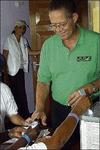

File photos
LEFT: The victorious Jamaica Labour Party Leader, Bruce Golding, votes in the St. Andrew North Eastern Division on election day, September 3.
RIGHT: Then Prime Minister Portia Simpson Miller casts her vote in Kingston during the September 3 general election.
Avia Collinder, Freelance Writer
Research findings on the media representation of women in the 2007 General Election in Jamaica indicate that gender, colour and class were influential elements in the campaign, which led to a victory by the Jamaica Labour Party (JLP), and the loss of power by the People's National Party (PNP).
A content analysis of campaign advertisements and cartoons seems to suggest that PNP leader Portia Simpson Miller suffered most from the advertising messages, which focused on her popular working-class image.
The research findings were presented recently by researcher Kinisha Correia, at a special forum entitled 'Women in Politics: Reflections on the 2007 General Election in Jamaica', put on by the University of the West Indies Centre for Gender and Development Studies (CGDS).
According to the researcher, frequent use of advertisements with working-class women, may have lost the PNP support among sections of the middle class.
Little impact
PNP advertising efforts to discredit Bruce as a 'flip-flopper', and implicit claims that the JLP disrespected women seemed to have had little impact on voters, the research found.
"Explicit, enhanced electronic images portrayed Portia as a lower class, raucous, virago - an inner-city black woman, ('don't draw my tongue')," the analysis found.
Correia, a consultant with the UWI's Centre for Gender and Development Studies, said the advertisements perpetuated the stereotypes of women as "unable to lead, must be led, emotional and therefore unstable in leadership."
The study also disclosed that currently, women comprise12 per cent of the Parliament, 24 per cent of the Senate, and 17.6 per cent of the Cabinet the population reflects 51 per cent females and 49 per cent males.
Correia attributed causes of this inequality to the existence locally of a patriarchal ideology which says that politics is the man's domain while the home is the woman's domain; bias against women candidates; and limited support to women in search of political power.
While the PNP's advertisements and cartoons carried explicit messages of Simpson Miller as compassionate and motherly, a powerful woman, and friend of the poor, women and children, they were cumulatively less effective than those created by and for the JLP, the research found.
Explicit messages in JLP advertisements included the proposal that Golding could manage the prime minister job ('driver' for the 'team'), and that Simpson Miller could not handle the job as she had little team support.
Public perception
Correia noted that the new JLP team was effectively portrayed as largely brown-skin, successful, educated, middle class, worldly and competent.
"The ads caused readers of the print media to question her ability to lead," Correia said, "The media played a major role in forming public perception."
The consequences, the researcher indicated, include a negative view of female political aspirants as fearing and rejecting a hostile political and media environment, slander and anti-female attacks in advertisements.
Correia recommended that all interest groups support special measures to promote gender-equality in political governance - e.g constitutional reform; new laws; quotas for female candidates; a changed political culture does not put women at a disadvantage - and play their part in reintroducing civic education with a gender component for all, especially the youth.
She said that political parties were also obligated to support training in gender and leadership, establish quotas for female candidates, and develop a gender agenda.
Support for women in politics has long been an issue, highlighted by women's groups in Jamaica. At a media-familiarisation breakfast held for the 21 female candidates just before the general election, Hermione McKenzie, chair of the Jamaica Women's Political Caucus (JWPC), called for the society to be more supportive of women political candidates. She particularly appealed for women in corporate Jamaica to be more economically and socially supportive.
"Women in politics need a political support network," she said. "Instead of being able to rely on the support of business women, they have had to resort to the help of friends, well wishers, our own resources as members (of the JWPC) and the proceeds of small fund-raisers."
The forum, where Correia discussed her research findings, was held in conjunction with the Women's Resource and Out-reach Centre, the Bureau of Women's Affairs, The Jamaica Women's Political Caucus, the Association of Women's Organi-sations of Jamaica, and the Freidrich Ebert Stiftung Institute in Kingston.
Article produced in collaboration with Panos Caribbean.Email: jamaica@panoscaribbean.org

